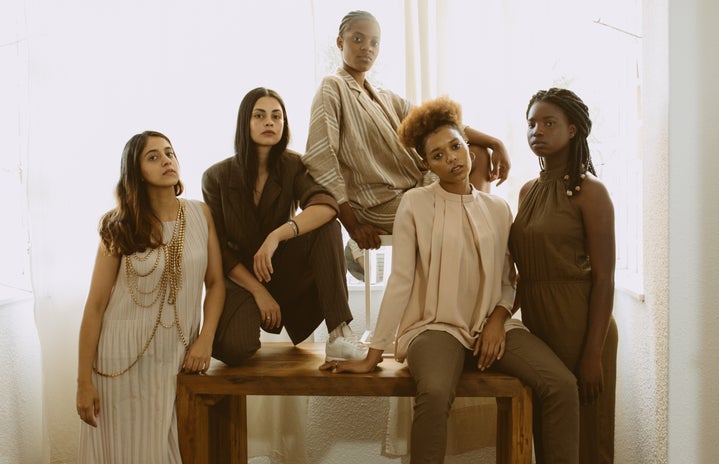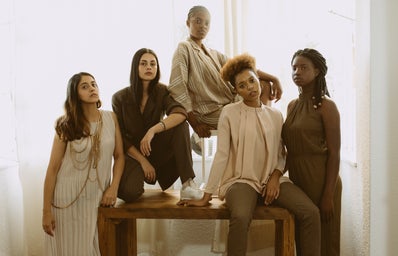International Women’s Day is here and what better way to celebrate than learning about inspiring stories about other strong women? With that in mind, we gathered five touching stories from women with empowered trajectories.
- My fear can’t break me
-
Rai de Almeida, 66
Raimunda de Almeida comes from a very poor family. They left her hometown in the state of Paraíba (North-East of Brazil) looking for better living conditions when she was 3 years old.
Since a very young age, Rai remembers feeling unconfirmed about her situation. She would become the rebel daughter, standing up for her rights and insisting on going to school. Finally, her parents accepted her attending classes, but they couldn’t afford her material or uniform. “I didn’t have a pencil to write”, Rai remembers, with tears in her eyes. “Today, every time I get a pen, I think about giving it to someone who really needs it”.
Her years at school were only possible because of other people’s help – older girls who landed her their books, a shopkeeper girl who would give Rai some bread. She didn’t even have money to take the bus to school.
When Rai was in high school, she had to work as a maid and house cleaner. Rai wouldn’t stay quiet when she felt she was being wronged, and that, sometimes, would cost her job.
At 19 she got married to an abusive man who would beat her. Touched, she remembers being so beaten that once she lost the baby she was carrying.
Rai became aware of the class struggle in 1978 when there was a national-level strike. She was the only woman in her city who participated in the strike, and people began to know her.
In 1980 Rai affiliated with the Workers Party (PT), wishing to make a revolution. Then she became politically conscious. She was a candidate to be councilwoman and was elected in 1988. In that year she went to Law school because she wanted to have the theoretical knowledge to make justice. Rai was the first of her family to go to university.
Rai brought the female agenda to the City Council since she was the only woman among 20 other councilmen. She started being criticized because men didn’t want to talk about female rights. “Talking about women was like some sort of sin”, says Rai. “Violence against women is so naturalized that men aren’t able to look at that as something wrong”.
Today Rai is on her third mandate as a councilwoman. She was part of Dilma’s government and suffered with the coup against Dilma, who is a woman. “We are survivors of this sexist world”, she says.
Rai recognizes she is an exception: “There are worse stories, with saddest endings”. But she remains fighting for a better world for women, defending the feminist agenda. “My fear can’t break me. It needs to be my drive”.
- I decided to go as far as I could
-
Ana Durvalina Bomtorin, 37
Ana Durvalina Bomtorin comes from a very “Brazilian” family: her mother is black, her father is a descendant of Italian immigrants. Her parents couldn’t complete their studies, but always incentivized Ana to study. “My mother wanted me to be independent, to study. I think that was so instilled in my mind that I decided to go as far as I could. I wanted to follow the academic career”, says Ana.
When she was a child, Ana remembers being bullied because of her appearance. “People would talk about my hair”, she recalls. “But I would only understand that it was racism after I studied about it. Back then, I couldn’t understand the dimension of what was happening, I felt I was in the wrong place”.
At 19 Ana left home to go to university. She went to the University of São Paulo (USP) to study Biology and was the only black woman in her class. Right after, she started post-graduation courses and went abroad to continue her studies. Ana had a very sexist and xenophobic professor when she was in England, and remembers feeling outraged.
After 30 years old, Ana realized she didn’t want to follow the academic career, so she came back to her hometown. Her dog got sick and the veterinarian ordered some tests. That was when she met a woman in the laboratory who was looking for a place to carry out the tests. This inspired Ana to open her own business, called PanDNA, an enterprise that performs genetic tests on animals.
Racism and prejudice were always present in her life: “People look at me and assume that I’m a pedicure, a manicure, but never a scientist”. So she decided to discuss the agenda of women in science. In 2016, she started a militant group composed only of women. She recently left the group and became a member of the Instituto Piracicabano de Pesquisa e Defesa da Democracia (IPED), an institute of reflection and action for democracy. Ana was re-elected as vice-president and tries to bring the voice of black women to this environment.
- I love being challenged
-
Helena César Pacello, 21
Helena César Pacello is the kind of person that knows what she wants. When she watched a video in school about Médicins Sans Frontiers (MSF) she decided that she wanted to be a doctor.
She loves being challenged: “I tend to step out of my comfort zone, I think it brings motivation and improves my self-esteem. I’m very competitive, but with myself, not other people”.
In the last year of High School, she participated in a Professions Fair. She discovered the possibility of studying Medicine in Germany. That became her goal, even though she didn’t speak German.
After concluding high school, Helena moved to Germany to study the language, leaving home at only 17. She knew it would be very hard to live in a country where she didn’t know anyone, didn’t speak the language and was all by herself. “But I had a goal and a plan to achieve it, and that kept me going”. As a very focused person, Helena could fluently speak German after six months.
Being distant from her family was really difficult. Helena comes from a small, united family, and living abroad was her first experience far from her loved ones. But once she started facing Germany as her new home, it became easier.
After one year, her German classes ended and she started a leveling course foreign students need to take before applying to university in Germany. It was really challenging because the German school program is different from the Brazilian one, and also because only the students with the best grades would be able to apply for the Medicine course. After studying really hard, at the end of that year, she had the best grades in her class and won a prize for her performance in Physics.
At the beginning of her third year in Germany, Helena was accepted at the University of Tübingen, one of the five best Medicine schools in the country. “This is my biggest accomplishment, as well as becoming an independent woman”.
Living in Germany has brought Helena many opportunities and possibilities, but nothing is perfect. “It is very hard being a Latin woman here. I’ve suffered harassment”, Helena tells. “I believe the feminist agenda is stronger nowadays, but women still haven’t conquered the respect they deserve – to be anything they want, but also to be a woman”.
- I’m in the best place I could be
-
Márcia Aparecida Lima Vieira, 47
Márcia Aparecida Lima Vieira comes from a family with scarce resources. At a very young age, she found in the books an opportunity for a better life. She managed to go to university to study Pedagogy, but was always relying on scholarships, and started working to pay them.
Márcia believes that having studied more than any woman in her family has brought her a lot of responsibility, and sees studying as an empowerment factor, as well as being a black woman: “Between childhood and adolescence I developed a perception about what it means to be a black woman in the modern society, and I only developed such perception because of my passion for the books”, she tells.
She participated in adults’ alphabetization programs in Brazil and abroad and won a prize for her work in Mozambique. “I’ve got to know homeless people since I was a little girl, and I’ve always wanted to do something for them”, Márcia remembers. “Having the opportunity to work with this public is an enormous accomplishment for me”.
She believes that recently women have conquered important rights, such as Maria da Penha Law in Brazil, access to more advanced levels of study and campaigns like “My Body, My Rules”. But she also thinks that women still have to gain equality from childhood to the labor market. “Society establishes female and male spaces and it is for us to question this extremely limiting space that has always been assigned to women”, says Márcia.
One of her biggest challenges is to conciliate work and motherhood. “Even though I have a lot of support from my family, especially my mother, we women tend to feel guilty for leaving our children. I started social work when my daughter was very little, and I would travel a lot. I felt guilty. I think we demand too much of ourselves”.
Today, Márcia works as a school principal. “I have the consciousness that I’m in the best place I could be, and I aim to take the consequences for my choices and live coherently with my actions and beliefs. I love what I do”.
- We are together
-
Zeni de Lima Soares, 78
Zeni de Lima Soares was born in the countryside, and there she spent her childhood. She studied at the local school, but after concluding the third grade she had to move to the city to continue her studies. Fortunately, Zeni’s family valued equal education for boys and girls. Her mother moved a lot to allow her children to study. “Leaving home to study was fundamental when the access to school was really limited, especially for people from the countryside”, Zeni remembers.
After concluding school, she participated in a juvenile congress of the Methodist Community and got amazed by the missionary life. Then Zeni started studying Cristian Education – the female alternative, while men would study Theology.
After that, she started working on a Home for abandoned, orphan, or criminal girls, an institution related to the Methodist Church. The Home had very rigid rules, and Zeni decided to make some changes so that the girls would be treated as human beings. She banished the uniform and scheduled excursions and doctor appointments outside the Home. “Since the local Church was really strict, I needed to have some strategy to make these changes”, says Zeni. “I started calling women from the community to help me. They would come to the Home to make new clothes for the girls, for example. Then they began to support me, and the Church couldn’t stop me. All I wanted was to educate the girls to be self-sufficient and independent”.
In 1970, the Methodist Church included on its statute the possibility of women to become pastors – until then, that was exclusive for men. “I remember thinking: ‘If no woman applies, the Church will think women don’t care about it and they might go back on that decision”, Zeni tells. “That was one of the reasons that lead me to apply”. After a two-year probative period, Zeni became the first female pastor of the Methodist Church. That brought many challenges and debates about clothing and salary, for example.
During all her trajectory, Zeni cared about women and children. “Women’s fights are never exclusive of women. There are always a lot of people that follow – children, elder people, marginalized people – because women are inclusive”. She created a Mother’s Club that helped in the empowerment of women and participated in many works with homeless boys and girls. When the Child and Adolescent Statute (ECA) was approved in Brazil, she helped with the creation of a carnival group, Eureca, to disseminate the ECA’s articles in an accessible way. Both groups – then Mother’s Club and Eureca – exist until the present day.
Zeni remembers facing a lot of challenges for being a woman, such as conciliatory work and motherhood – she is the mother of two girls and a boy. “But that didn’t stop a significant militancy, thanks to the solidarity and the sorority of many other women”, she says. “We are together and we are going to outcome this difficult scenario”.
—————————————————–
The article above was edited by Lívia Carvalho.
Liked this type of content? Check Her Campus Casper Libero home page for more!


